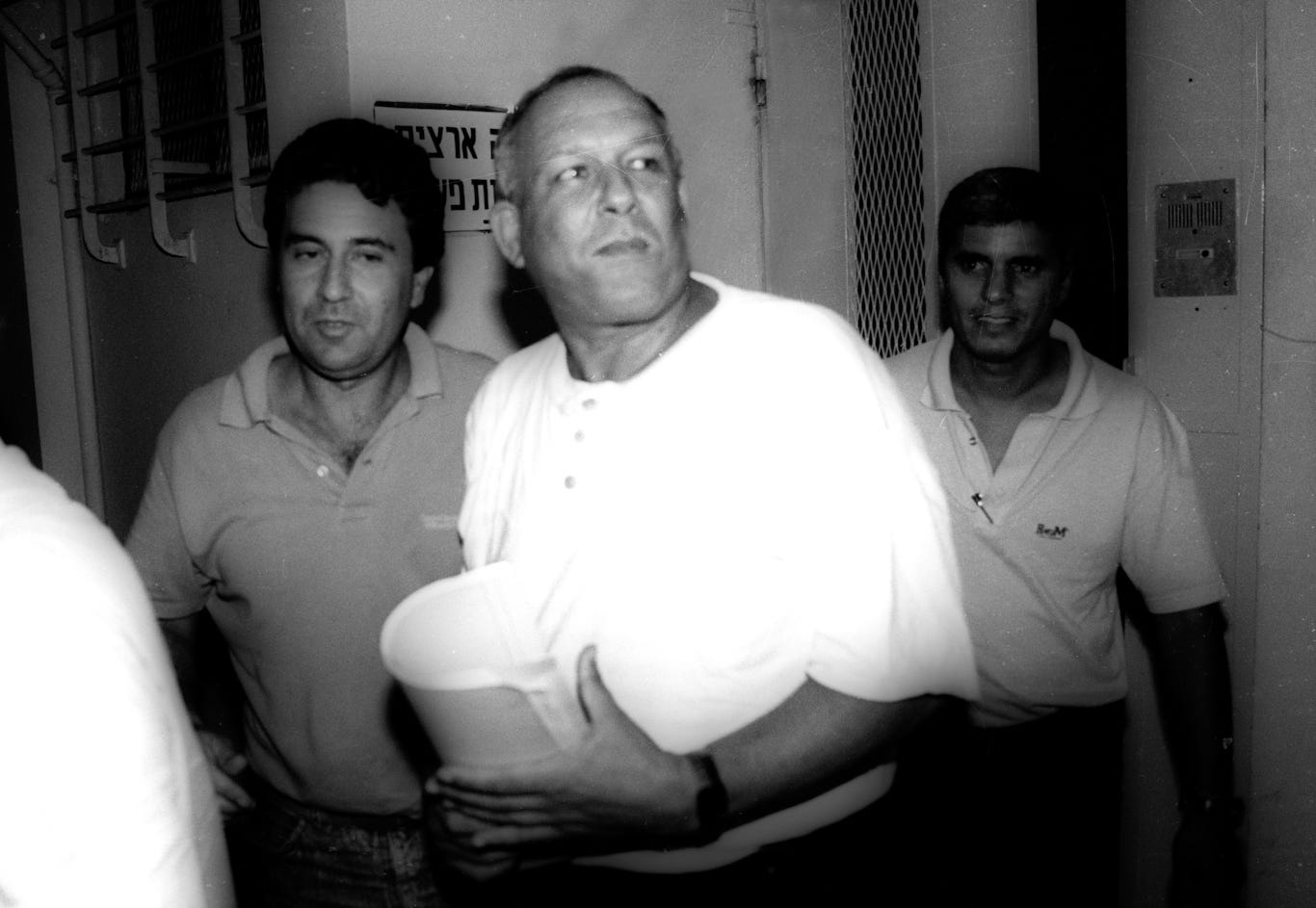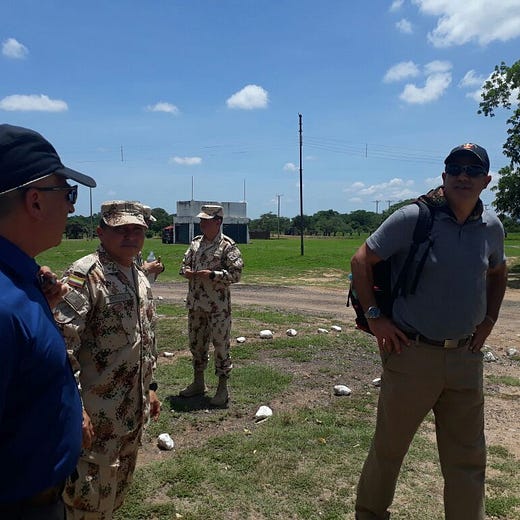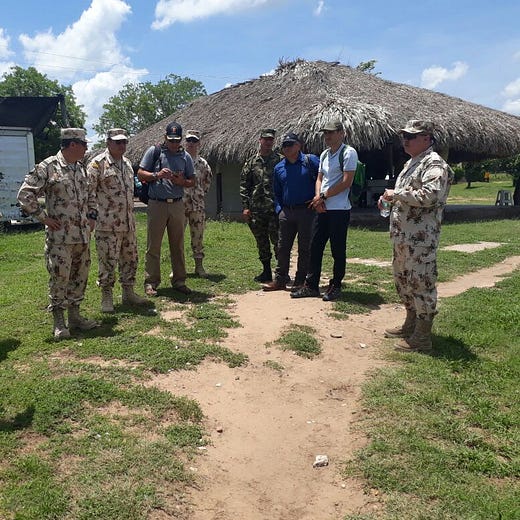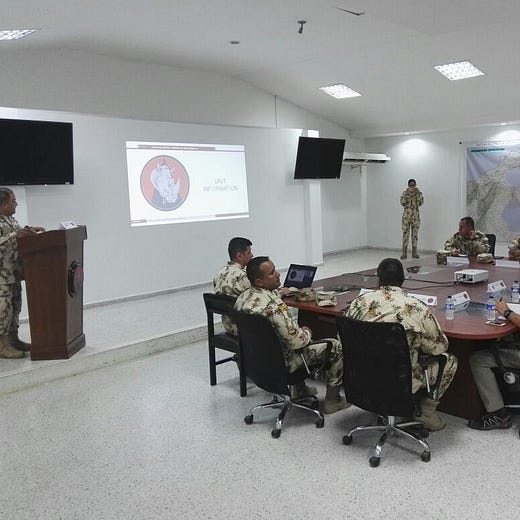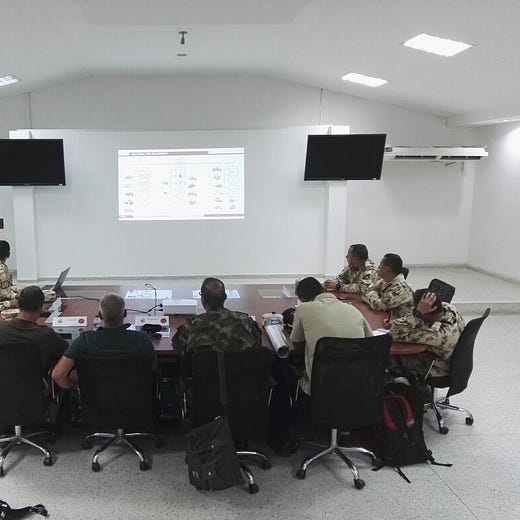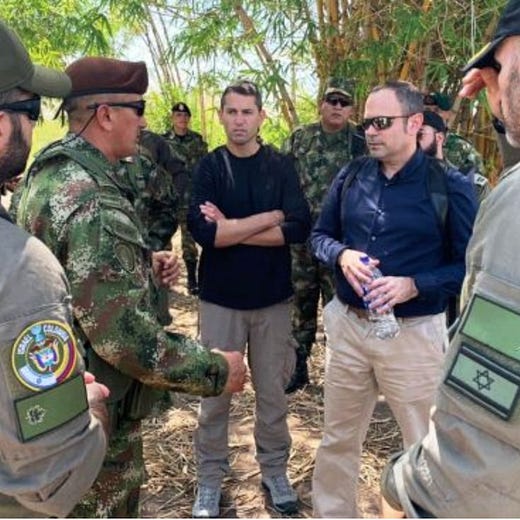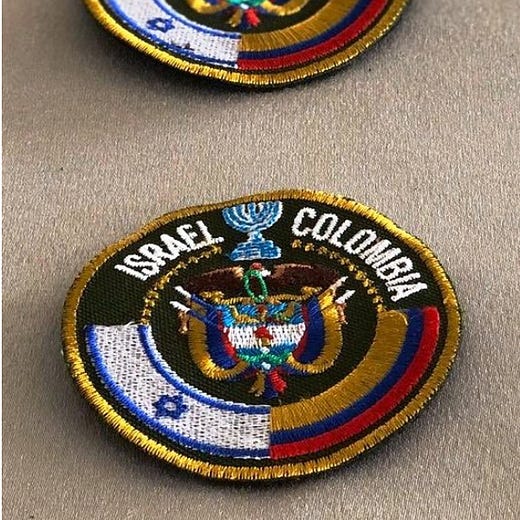Israel & Colombia: Mercenary Allies - Part 2
New Investigation Reveals Role of Israeli Operatives in Colombia’s “Political Genocide”
Please read Part 1 first
Yair Klein arrives in Colombia
For Colombians, a different Israeli is well-known for his role in the death squad rampages that have plagued the country since the 1980s. While Eitan was advising President Barco, an Israeli mercenary named Yair Klein arrived in Colombia and began training narco-paramilitaries in how to defeat the FARC insurgency.
A retired military officer, Klein started a mercenary firm called Hod Hahanit (Spearhead) in 1984, drawing from the pools of former Israeli police and special operations units.
According to the book All Is Clouded by Desire: Global Banking, Money Laundering, and International Organized Crime, the mercenary outfit struck its first deal amid the civil war in Lebanon, supplying the notoriously brutal Christian Phalangist militias – the same force that massacred between 800 and 3,500 Palestinian refugees in the Sabra and Shatila camps under direct Israeli military supervision in September 1982.
In 1987, Klein landed in Colombia to meet with Israeli Lieutenant Colonel Yithzakh Shoshani and Arik Afek, both of whom had established themselves years before with lucrative deals selling military equipment in Colombia. Shoshani subsequently became the main conduit between Klein and his Colombian customers.
In 1990, Afek’s decomposing body was found with multiple gunshot wounds in the trunk of a car at Miami International Airport after a pedestrian noticed the odor. He was reportedly being investigated by the CIA and was wanted by Colombian authorities.
Klein told me in a telephone interview that he was working through the Israeli Ministry of Defense and the state-owned weapons manufacturer, Israel Military Industries (IMI), which had a contract with a Colombian data surveillance company obtained through Colombia’s Ministry of Defense. He said he was originally hired to provide security for the banana-growing operations in the region of Uraba, where the American fruit company Chiquita had paid millions of dollars to Colombian death squads.
Shoshani, he explained, worked for a company called AMKAN, which is a subsidiary of IMI. The Colombian Federation of Cattlemen, long known for its ties to paramilitaires, contacted Shoshani to have Eitan train a force to fight guerrillas.
With Shoshani guiding him, Klein returned to Israel in 1988 and met with top paramilitary and military figures as well as wealthy businessmen. All of this, Klein assured me, was done with the full knowledge of the Israeli government. “You can’t do anything without permission from the Ministry of Defense,” he said.
Klein’s statement upends the claim of then-Defense Minister Yitzhak Rabin, who told the Jewish Telegraphic Agency that the Israeli Defense Ministry had denied Klein’s company a license and warned him to leave the country.
Death squad leader: ‘I learned an infinity of themes in Israel’
Klein held three training sessions, each for around 30 people. Assisting him were three trainers, all of whom were colonels in the Israeli army: Tzadaka Abraham, Teddy Melnik and Amatzia Shuali.
Klein trained brothers Carlos and Fidel Castaño, the squad leaders who would go on to form the notoriously violent United Self-Defense Forces, known in Spanish by its acronym, AUC. Under the patronage of wealthy landowners, drug lords, ranchers, politicians and the Colombian military, the AUC committed bloodcurdling massacres all over the country, even using chainsaws to murder and dismember peasants, all aimed at terrorizing communities into fleeing from their land. The United Nations estimated in 2016 that the AUC was responsible for 80% of the deaths in the conflict.
Eventually Carlos Castaño was killed, allegedly by his brother Vicente, another powerful paramilitary leader. And, though the AUC officially demobilized in 2007, the paramilitaries soon enough were reconfigured under various banners and new formations, remaining closely linked to the state and business interests.
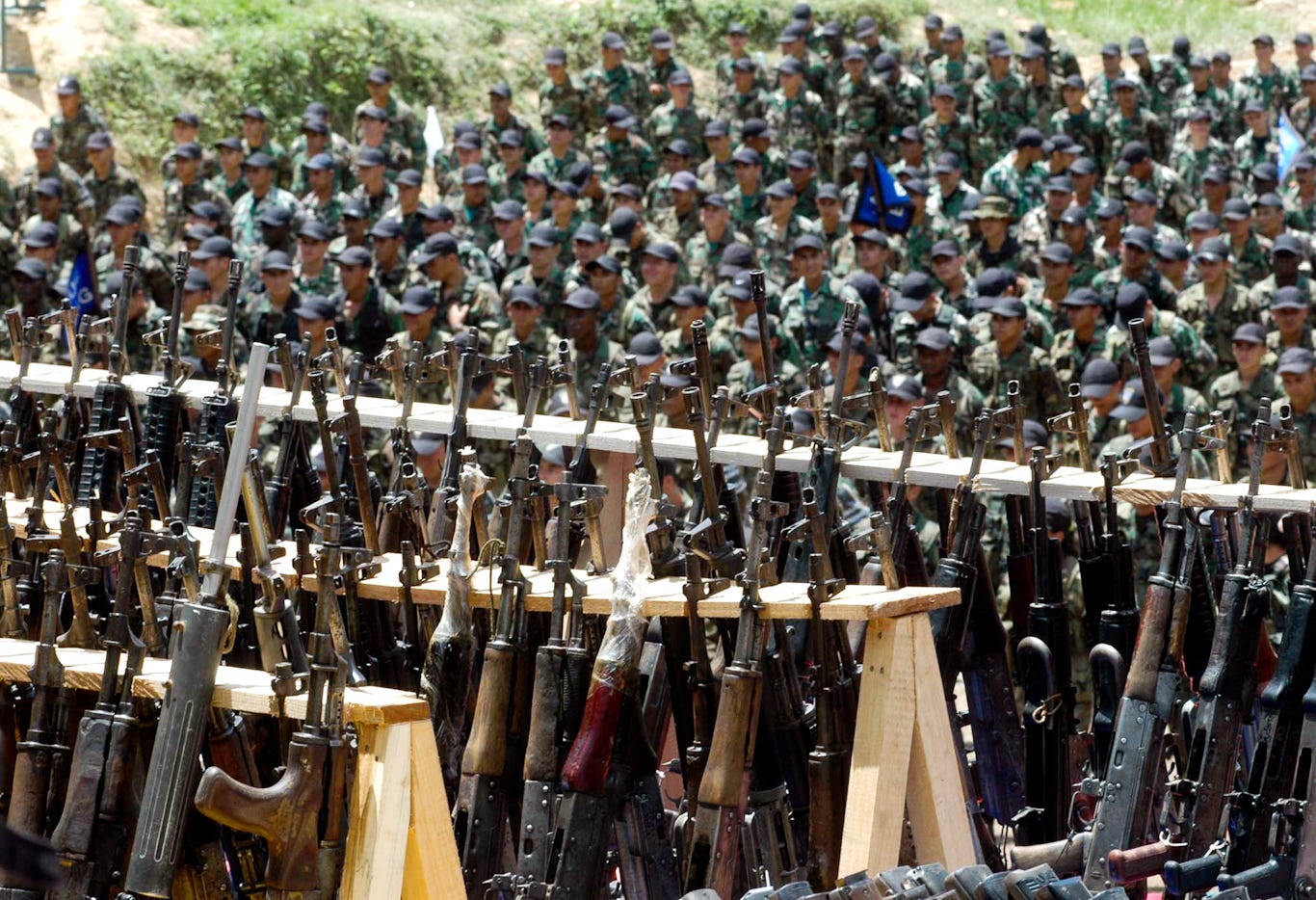
But Israel’s influence in Colombia’s death squads is not only through Klein’s training. In his autobiography, AUC founder Carlos Castaño wrote that he had studied from 1983-1984 in Jerusalem’s Hebrew University and in Israeli military schools. Castaño described the training in advanced weaponry and tactics he received that would become the basis of Colombian paramiltarism’s war against farmers:
I received instruction in urban strategies, how to protect oneself, how to kill someone or what to do when someone is trying to kill you. …We learned how to stop an armored car and use fragmentation grenades to enter a target. We practiced with multiple grenade launchers, and learned how to make accurate shots with RPG-7s, or shoot a cannon shell through a window.”
Castaño also “received lectures on how the world arms business operates, and how to buy arms.”
In addition to the military training he received, Castaño credits his time in Israel with revolutionizing his entire worldview. During that period, the soon-to-be mass-murderer became an ardent admirer of Zionism and became convinced it was possible to stamp out the insurgency at home in Colombia:
I admire the Jews for their bravery in confronting anti-Semitism, their strategy for survival in the diaspora, the surety of their Zionism, their mysticism, their religion, and above all for their nationalism… I learned an infinity of themes in Israel and [to] that country I owe a part of my culture, my achievements both human and military, and while I repeat myself, I did not learn only about military training in Israel. It was there that I became convinced that it was possible to defeat the guerrillas in Colombia. I began to see how a people could defend itself from the whole world. I understood how to get someone involved who had something to lose in a war, by making such a person the enemy of my enemies. In fact, the idea of “autodefensa” [self-defense] weapons I copied from the Israelis; every citizen of that country is a potential soldier.”
Klein also trained Jaime Eduardo Rueda Rocha, who in 1989 assassinated Liberal Party presidential candidate Luis Carlos Galán, the overwhelming favorite to win the upcoming election. Not only had Klein trained the killer, but the weapon Rueda used was part of a shipment Klein orchestrated of 500 Israeli-manufactured machine guns from Miami to the Medellin drug cartel, according to a 1989 Senate Committee on Foreign Relations report. (In 2016, Miguel Alfredo Maza Márquez, head of Colombia’s then Administrative Department of Security (DAS), was convincted of participation in the plot to murder Galán and sentenced to 30 years in prison. He has since testified that top-ranking members of the military plotted Galan’s assassiation.)
As the revelations that a military reserve officer had been training death squads created an international scandal, the Israeli government filed charges, convicting Klein of illegally exporting weapons and military expertise.
In 2001, the Colombian government tried Klein in absentia, sentencing him to eleven years in prison. In 2007, Klein was arrested in Moscow on a warrant issued by Interpol, and spent three years in prison. Colombia sought his extradition, but in November 2010 the European Court of Human Rights ruled that Colombia could not guarantee his physical safety. The Russian government complied with the ECHR’s ruling and released Klein, allowing him to return to Israel. Colombia has since requested his extradition, but the Israeli government has refused.
Klein’s company, Hod Hahanit, remains active to this day.
A joint effort?
While Donadio’s groundbreaking investigation has created a controversy in Colombia, it does not answer whether Rafi Eitan and Yair Klein’s simultaneous and respective operations advising the government and death squads were a joint effort or merely coincidental.
For his part, the lawyer Ernesto Villamizar told Donadio that Eitan and Klein had nothing to do with each other.
Klein corroborated his claim, saying that he was unaware of any of Eitan’s activities in Colombia.
However, an AP article references an Israeli media report that Rafi Eitan (spelled Eytan in the article) was in Colombia at the same time as Klein and left days before the gunman armed and trained by Klein murdered presidential candidate Luis Carlos Galán:
It [the media report] said Rafael Eytan, an Israeli counterterrorism expert, denied suggestions that he was a consultant to Israeli companies operating in Colombia and said he had cut all business ties to that country.
According to the report, Eytan confirmed he flew to Colombia a week ago for private reasons.
Beyond the vague suggestion of that article, there is no evidence of a connection between Eitan and Klein. In some ways, it is even more remarkable that two Israelis advising Colombian government in mass-murder of its political opponents were operating independent from and unbeknownst to each other.
Israel-Colombia relations cool
After the fallout of Israelis training Colombian paramilitaries, the relationship between the two top U.S. allies cooled, according to U.S. diplomatic cables released by WikiLeaks. But as Plan Colombia was implemented, Israel and Colombia once again ramped up collaboration.
In December 2006, Colombia’s Ministry of Defense hired another private Israeli security company known as Global CST to “help the GOC [Government of Colombia] conduct a strategic assessment of the internal conflict.” Global CST is headed by Israel Ziv, a career officer who, like Yair Klein, leveraged his military experience into a profitable career advising and training despots around the world.
“General Ziv was a personal acquaintance of then-Minister of Defense Juan Manuel Santos,” the cable notes. William Brownfield, then U.S. ambassador to Colombia commented that “Ziv worked his way into the confidence of former Defense Minister Santos by promising a cheaper version of USG [United States government] assistance without our strings attached.”
Under Santos, Colombia sought to purchase Israel’s Hermes-450, a drone under development in the occupation of the West Bank and Gaza Strip, and in wars against neighboring Lebanon.
However, according to the diplomatic cable, Tel Aviv-Bogota relations again soured after it emerged that Global CST interpreter and Argentine-born Israeli national Shai Killman “had made copies of classified Colombian Defense Ministry documents in an unsuccessful attempt to sell them to the Revolutionary Armed Forces of Colombia.” These documents contained “high value target (HVT) database information” – a reference to the FARC leadership the CIA assisted the Colombian government in assassinating. The resulting fallout, combined with pressure from the U.S., compelled Colombia to cancel the contract to buy Israeli drones.
Despite the strains in the decades-old relationship, the two countries have maintained strong ties. In 2016, then-Israeli Ambassador to Colombia Marco Sermoneta boasted that Colombia is the top recipient of Israeli aid.
The following year, as the extermination of social leaders and ex-combatants began, Israeli military advisors visited Colombian military bases to give training courses in “security.”
Genocide redux
President Ivan Duque, the handpicked successor of far-right former President Álvaro Uribe, has worked assiduously to shore up Colombia’s ties with Israel. In March 2020, he appeared at the American Israel Political Action Conference, boasting about his ties with Israel. Months later, Duque and Israeli Prime Minister Benjamin Netanyahu announced the launch of the Israel-Colombia Free Trade Agreement.
Meanwhile, Duque has undermined and attacked the landmark 2016 peace accord at every turn, while turning a blind eye to the mass-murder of demobilized FARC guerrillas, trade unionists, human rights defenders, environmental activists and social leaders – a scenario eerily reminiscent of the political genocide of the Patriotic Union. Rather than a veteran spy advising the Colombian government, Israel now has an official presence. In January 2020, Israeli military Brigadier General Dan Glodfus visited a Colombian military base to reinforce ties between the two countries. Amid a spate of massacres in September 2020, Israel dispatched 10 instructors to train Colombian Special Forces in “counter-terrorism.”
About the Author
Dan Cohen is a journalist and filmmaker in Washington, D.C. with Behind the Headlines, a new viewer-supported investigative journalism series. Dan has also contributed to a wide range of news outlets, including Al-Jazeera, Alternet, The Grayzone and RT. His film, “Killing Gaza,” explores Operation Protective Edge, the 2014 Israeli assault on the highly populated strip. His latest article, which is discussed today, is called “New Investigation Reveals Role of Israeli Operatives in Colombia’s ‘Political Genocide.’”


